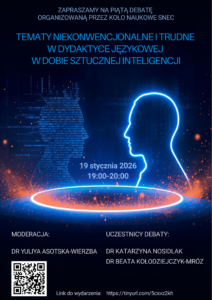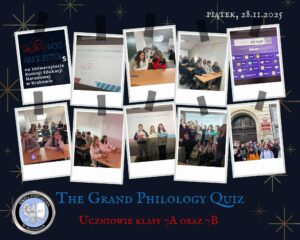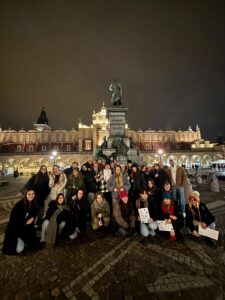dr Ewa BOROWIEC

- Adiunkt dydaktyczny/Senior lecturer
Positions held in the Institute and the University/Pełnione funkcje w Instytucie Uniwersytecie:
- Koordynator ds. języka angielskiego ogólnego w ramach Małopolskiej Chmury Edukacyjnej.
- General English programme coordinator for Małopolska Education Cloud.
Degrees/Stopnie naukowe:
- ;PhD in linguistics;
Tytuł pracy/Thesis: „Reflexive Pronouns in Early Modern English”;
Supervisor:/ Promotor: Prof. dr hab. Adam Pasicki;
Recenzent:/ Reviewer: Prof. dr hab.Piotr Ruszkiewicz; Prof. dr hab. Rafał Molencki.
- 1995; MA in linguistics;
Uniwersytet Jagielloński;
Tytuł pracy/Thesis: „Types of modality in narrative discourse – an analysis based on Rocannon’s World and Planet of Exile by Ursula Le Guin”;
Supervisor:/ Promotor: Prof. dr hab. Elżbieta Chrzanowska-Kluczewska;
Recenzent:/ Reviewer: Prof. dr hab. Elżbieta Mańczak-Wohlfeld.
Main field of research/Dyscyplina naukowa:
- Linguistics
Department/Katedra:
- Department of English Language Education/Katedra Dydaktyki Języka Angielskiego
Research Interests/Zainteresowania badawcze:
- Interpersonal communication,
- Pragmatics,
- Discousre analysis,
- Historical linguistics.
Teaching/Prowadzone zajęcia:
- Critical discourse analysis,
- Pragmatics of conversation,
- English Grammar,
- PNJA (Practical English) – writing,
- Contrastive Grammar,
- Interpersonal Communication,
- Hisory of the English language.
Membership in Academic Societies/Członkostwo w Towarzystwach Naukowych:
- N/A
Selected visiting lectures/Wybrane wykłady gościnne:
- N/A
Main Publications/Najważniejsze publikacje:
Monografie:/ Monographs:
- „Self-based Anaphora in Early Modern English”. Frankfurt: Peter Lang, 2013.
Artykuły:/ Articles:
- „Cohesion- Between Instruction and Execution”, w:Anglica Wratislavensia 56 (2018), s. 231-247
- „Exemplification in academic discourse structure”, w: Linguistics Beyond and Within 2 (2016), s. 111-125
- „Non-verbal uses of like in Early Modern English”, w: Polysemy in Language and Translation / edited by Bogusław Bierwiaczonek, Joanna Paszenda, Katowice : EDYTOR 360, 2016
- „How to bite Harry Potter? Names in J. K. Rowling’s series as a challenge for the Polish translator”, w: Annales Universitatis Paedagogicae Cracoviensis. Studia Anglica. (2015), Z. 5, s. 29-38
- Non-verbal like and its Polish equivalents: a case study, w: Spotlight on melody and structure in syntax and phonology / Anna Bloch-Rozmej, Anna Bondaruk, Anna Prażmowska (eds.), Lublin: Wydawnictwo KUL, 2015.
- The Structure of the Noun Phrase in English and Polish in: Annales Universitatis Pedagogicae Cracoviensis. Studia Anglica II. Red. Mariusz Misztal i Mariusz Trawiński. Kraków: Wydawnictwo Naukowe UP, 2012.\
- The Relevance of Chomsky’s GB Theory for the Description of SELF Pronouns in the Writings of Shakespeare w: New Trends in English Teaching Education. Red. Igancio Ramos Gay, A. Jesus Moya Guijarro i Jose Ignacio Albentosa Hernandes. Cuenca: Ediciones de la Univesidad de Castilla – La Mancha, 2008.
- Locally Free Reflexives in William Shakespeare’s Plays in: Language and Identity. English and American Studies in the Age of Globalization: Language and Culture. Red. Justyna Leśniewska i Ewa Witalisz. 2t. Kraków: Jagiellonian University Press, 2006.
- Should We Teach Historical Grammar? Some Remarks on the Place of the History of the English Language in Modern Syllabuses in Studies in Teacher Education: Language, Literature, and Culture. Red. Misztal Mariusz i Mariusz Trawiński. Kraków: Wydawnictwo Naukowe AP, 2005.



